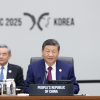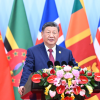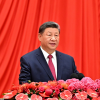热词翻译:“顽瘴痼疾”英文怎么说?
“顽瘴痼疾”英文怎么说?
根据热词译文件报告翻译数据库,在《中共中央关于党的百年奋斗重大成就和历史经验的决议》的翻译中,“顽瘴痼疾”被翻译为:
顽瘴痼疾
problems that had long plagued us
problems that had long plagued us
例句如下:
党中央发扬钉钉子精神,持之以恒纠治“四风”,反对特权思想和特权现象,狠刹公款送礼、公款吃喝、公款旅游、奢侈浪费等不正之风,解决群众反映强烈、损害群众利益的突出问题,推进基层减负,倡导勤俭节约、反对铺张浪费,刹住了一些过去被认为不可能刹住的歪风,纠治了一些多年未除的顽瘴痼疾,党风政风和社会风气为之一新。
With the persistence to keep hammering away, the Central Committee has made consistent efforts to tackle pointless formalities, bureaucratism, hedonism, and extravagance. It has opposed privilege-seeking attitudes and behavior, shut down extravagant and wasteful spending and use of public funds for non-work-related gifts, dining, or travel, and worked to solve prominent problems that invite a strong public response or harm the public’s interests. The Central Committee has reduced burdens at the primary level, and encouraged frugality while opposing wasteful spending. Thanks to these efforts, certain unhealthy tendencies that were once considered impossible to control have been reined in, and certain problems that had long plagued us have been remedied, while Party, government, and social conduct have significantly improved.
With the persistence to keep hammering away, the Central Committee has made consistent efforts to tackle pointless formalities, bureaucratism, hedonism, and extravagance. It has opposed privilege-seeking attitudes and behavior, shut down extravagant and wasteful spending and use of public funds for non-work-related gifts, dining, or travel, and worked to solve prominent problems that invite a strong public response or harm the public’s interests. The Central Committee has reduced burdens at the primary level, and encouraged frugality while opposing wasteful spending. Thanks to these efforts, certain unhealthy tendencies that were once considered impossible to control have been reined in, and certain problems that had long plagued us have been remedied, while Party, government, and social conduct have significantly improved.
热词链接
“顽瘴痼疾”在其他来源中的翻译:
1 《2023年6月12日外交部发言人汪文斌主持例行记者会》中“顽瘴痼疾”的翻译
美国出台《芯片和科学法》要求接受美政府补贴的企业10年内不得在中国扩大先进芯片产能,诱压盟友限制对华半导体出口,这不是典型的“经济胁迫”吗?美国泛化国家安全概念,滥用国家力量无理打压华为、TikTok等企业,这不是赤裸裸的“非市场行为”吗?美国连续多年独家阻挠世贸组织上诉机构法官遴选,导致争端解决机制陷入瘫痪,还拒不执行世贸组织生效裁决,这不正是对多边贸易体系的最大威胁吗?美国出台《通胀削减法》,大搞歧视性补贴措施,引发“补贴竞赛”,这不正是违规补贴扭曲市场的教科书式的案例吗?至于“强迫劳动”,这更是美国自诞生伊始便存在的顽瘴痼疾,时至今日在美仍有至少50多万人生活在现代奴隶制下并被强迫劳动。
The US CHIPS and Science Act prohibits companies that receive federal funding from expanding advanced semiconductor production capacity in China for a decade. It also cajoles and coerces US allies into restricting export of semiconductors to China. Isn’t this typical economic coercion? The US has overstretched the concept of national security and abused state power to suppress companies like Huawei and TikTok. Isn’t this clearly a non-market practice? For many years running, the US has been the only one impeding the appointment of new judges to the WTO’s Appellate Body, thus paralyzing the dispute settlement mechanism. The US also refuses to comply with WTO rulings in effect. Isn’t this the biggest threat to the multilateral trade system? The US has adopted the Inflation Reduction Act, resorted to discriminatory subsidies, and triggered a subsidy race. Isn’t this a textbook example of market-distorting illegal subsidies? As to forced labor, it is a persistent problem in the US as old as the country itself. Even today, more than 500,000 people in the US still live under the yoke of modern slavery and forced labor.
The US CHIPS and Science Act prohibits companies that receive federal funding from expanding advanced semiconductor production capacity in China for a decade. It also cajoles and coerces US allies into restricting export of semiconductors to China. Isn’t this typical economic coercion? The US has overstretched the concept of national security and abused state power to suppress companies like Huawei and TikTok. Isn’t this clearly a non-market practice? For many years running, the US has been the only one impeding the appointment of new judges to the WTO’s Appellate Body, thus paralyzing the dispute settlement mechanism. The US also refuses to comply with WTO rulings in effect. Isn’t this the biggest threat to the multilateral trade system? The US has adopted the Inflation Reduction Act, resorted to discriminatory subsidies, and triggered a subsidy race. Isn’t this a textbook example of market-distorting illegal subsidies? As to forced labor, it is a persistent problem in the US as old as the country itself. Even today, more than 500,000 people in the US still live under the yoke of modern slavery and forced labor.
2 《习近平在中国共产党第二十次全国代表大会上的报告》中“顽瘴痼疾”的翻译
我们持之以恒正风肃纪,以钉钉子精神纠治“四风”,反对特权思想和特权现象,坚决整治群众身边的不正之风和腐败问题,刹住了一些长期没有刹住的歪风,纠治了一些多年未除的顽瘴痼疾。
We have worked ceaselessly to improve Party conduct and enforce Party discipline. We have hammered away at the task of rectifying pointless formalities, bureaucratism, hedonism, and extravagance; opposed privilege-seeking mindsets and practices; and taken strong action to address misconduct and corruption that occur at people’s doorsteps. Thanks to these efforts, unhealthy tendencies that had long gone unchecked have been reversed, and deep-seated problems that had plagued us for years have been remedied.
We have worked ceaselessly to improve Party conduct and enforce Party discipline. We have hammered away at the task of rectifying pointless formalities, bureaucratism, hedonism, and extravagance; opposed privilege-seeking mindsets and practices; and taken strong action to address misconduct and corruption that occur at people’s doorsteps. Thanks to these efforts, unhealthy tendencies that had long gone unchecked have been reversed, and deep-seated problems that had plagued us for years have been remedied.
3 《2022年6月27日外交部发言人赵立坚主持例行记者会》中“顽瘴痼疾”的翻译
强迫劳动是美国自诞生伊始便已存在的顽瘴痼疾,漫长的蓄奴史就是其大搞强迫劳动的铁证。据统计,1525年至1866年间,累计有超过1250万非洲人被贩运到美洲从事强迫劳动。大量黑奴被迫从事社会底层劳动,被严苛的工作条件、高强度的劳动、奴隶主的皮鞭折磨侵害。美国的发家史,浸透着奴隶的血泪、汗水和生命。
Forced labor has been a deep-seated problem with the US since the day it was founded. The long history of slavery is solid evidence of forced labor in the US. According to statistics, between 1525 and 1866, over 12.5 million Africans were shipped to the New World for forced labor. Numerous black slaves were forced to work at the bottom of society and tormented by dire working conditions, heavy labor and the brutal whipping by slave owners. In many ways, the US’s fortune began with the blood, sweat, tears and ultimate sacrifices of slaves.
Forced labor has been a deep-seated problem with the US since the day it was founded. The long history of slavery is solid evidence of forced labor in the US. According to statistics, between 1525 and 1866, over 12.5 million Africans were shipped to the New World for forced labor. Numerous black slaves were forced to work at the bottom of society and tormented by dire working conditions, heavy labor and the brutal whipping by slave owners. In many ways, the US’s fortune began with the blood, sweat, tears and ultimate sacrifices of slaves.

 习近平在亚太经合组织第三十二次领导人非正式会议第一阶段会议上的讲话
习近平在亚太经合组织第三十二次领导人非正式会议第一阶段会议上的讲话 习近平在全球妇女峰会开幕式的主旨讲话
习近平在全球妇女峰会开幕式的主旨讲话 习近平在庆祝中华人民共和国成立76周年招待会上的讲话
习近平在庆祝中华人民共和国成立76周年招待会上的讲话 习近平在金砖国家领导人线上峰会的讲话
习近平在金砖国家领导人线上峰会的讲话 习近平:在纪念中国人民抗日战争暨世界反法西斯战争胜利80周年招待会上的讲话
习近平:在纪念中国人民抗日战争暨世界反法西斯战争胜利80周年招待会上的讲话